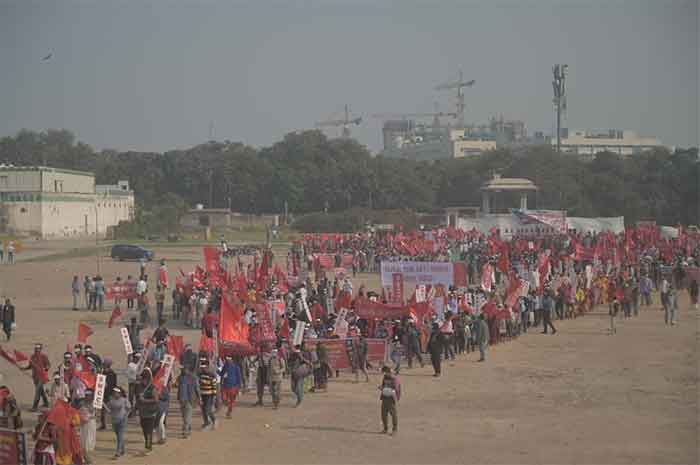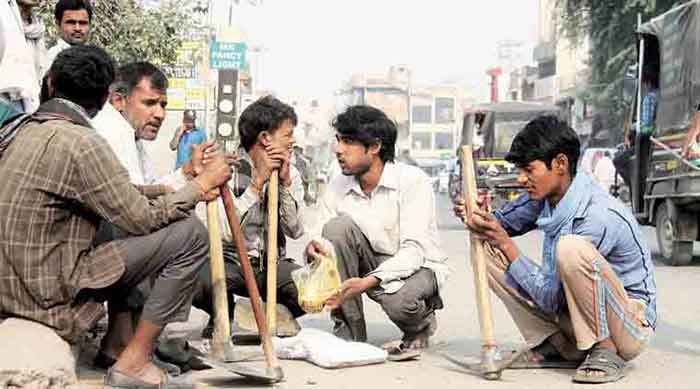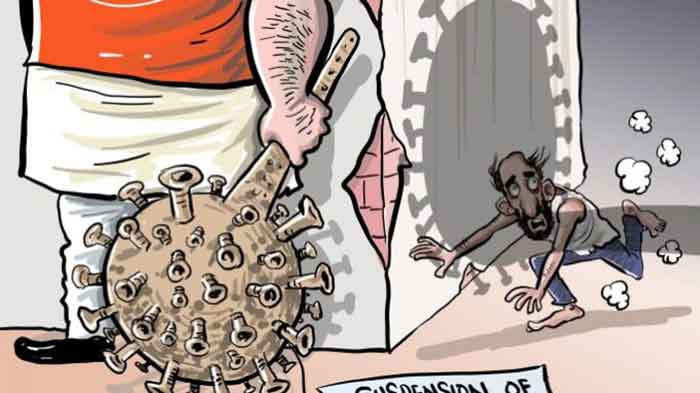
Back in the headlines
Even as we were getting used to a new set of technical terms and headlines, from the brand new name of the virus to social distancing to quarantine, suddenly there reappeared a word that we all assumed had receded for ever from the front page, namely, labour.
When is the last that we heard of ‘labour’ attracting the headlines and the attention of the elite commentariat on our pages and screens? All this while we have been hearing about the aam aadmi, about Hindus or Muslims, Dalits or Brahmins, women or men, but we thought ‘labour’ as a category was a thing of the past. Somehow it was taken for granted that 21st century capitalism, with its entire production machine, can work without labour, or labourers could be pushed to remote places in China and elsewhere, placed on the margins of the whole system, made invisible like Mr. India. When have you last met someone who holds the labour beat in any of the media conglomerates, a labour-related function in the corporate sector, or a job learning and teaching about labour in the academia? At best labourers were some numbers, with employment going up according to the State agencies, going down according to the critiques, so many employed in this or that industry, but who cared; anyway there was too much population!
Lo and behold, they were no more mere numbers, they occupied not just the pages and screens but literally all possible public places, the bylanes, the roads, the highways, the railway tracks, the parks, the platforms, everywhere, not only as aam aadmi, Dalits or Biharis, but as labourers! Those who could afford to be inside their houses suddenly woke up to a new reality, a world not only infested with a deadly virus but also teeming with working people. Suddenly the ministers and officials and experts seem to be debating about labour: who will keep them, who will send them, and who will receive them? While making those elaborate plans for the lockdown to keep the virus at bay, no one thought about the workers who actually run the economy as they, on empty stomachs, took to the streets across the length and breadth of this vast country, highway after highway, one flyover after another and from one track to another, that too day after day and night, week after week, a never-ending stream of working people who literally make the wheels of this country move.
As the tragedy literally unfolded in front of our eyes, the attention of our rulers seemed to be elsewhere. It was only after the markets crashed to record lows, and the reality dawned upon the bosses that they would need to restart something called the Economy (as if there were a switch somewhere that can simply be pressed), that it struck them that the first thing they would desperately need for starting it, really THE first thing, more than their money, machines, inputs and everything else, is labour, and hence what troubled them right in the midst of the virus was once again the question of labour!
Our Prime Minister, ever the great student and teacher of natural laws (remember his erudite exposition of the Newton’s law?), reassured the country that it was ‘human nature’ to go home at certain times, the obvious implication being that fellow humans seen walking on the highways and the railway tracks were driven by such a natural force. In line with this proposition, the chief ministers decided to use force, very much in the Newtonian paradigm, to stop labour from following their ‘natural’ tendencies; from Tamil Nadu to Karnataka to Maharashtra, ministers were quickly learning from one another. Applying further sophisticated theories, some other ministers were even willing to cajole and nudge the workers by welcoming them with flowers, in order that they not follow their natural tendencies of going home (or perhaps even asking for food).
‘Lawless’ Labour
As the lockdown came close to finishing its second month, with the virus very much on the prowl, and as we were settling down to a new normal of hungry, barefoot workers, young and old, women, men and children, walking and cycling hundreds and thousands of kilometres across the country, living and perishing on the roads, there was more news on labour. If any of us have interacted with labour even before this virus, on worksites, on the roads, at our homes, visited a labour court or wherever else, we are very much aware that there is hardly any presence of law in a worker’s life as a worker. All the labour laws, and there are plenty of them, that we might have found on the net or in our books existed only on our screen or paper, offering employment to some people as lawyers and as part of the labour machinery, but they have been mostly and increasingly conspicuous by their absence for workers, in homes, in agriculture, on construction sites, in factories, in restaurants, in transport and other services, or in most ‘outsourced’ work, even in large private or public establishments. So even if an entity called labour existed for some of us, definitely a concept called ‘labour law’ did not exist for most of them. But amidst the rampaging virus suddenly we witnessed a new great competition across the length and breadth of the country: who can make the labour laws disappear the fastest (even from the books)? So while the virus persisted, labour laws disappeared from book after book, state after state. So far, the state that has won the battle hands down is the state of Uttar Pradesh, where the long, tongue-twisting and cumbersome list of practically all the labour laws was made to vanish literally overnight. So now trade unions, strikes, minimum wages, liability for unsafe work practices, hours of work, overtime, anything else that you may think will hinder the capitalist, have all gone in a jiffy. For all practical purposes there is not even a pretence of State presence now to mediate between labour and capital in large parts of the country; perhaps there is no other country in the world where capital may feel so secure about doing to labour whatever takes its fancy – it is the unfettered market, the perfect Friedmanian construct!
The whole jingbang lot of the commentariat are so excited, the so-called news channels, the pink papers, all of them simply cannot stop gushing and marvelling at how the establishment has turned a great crisis into a supreme opportunity, and all the highways, where workers have been walking and dying, now would lead up to only one destination: China-like ‘development’ and the road to becoming a global power. Apparently the only thing that has been stopping us was the existence of these blessed labour laws. A great puzzle on which no expert is throwing any light is: if automation and all the great IT and service industries had made everything from agriculture to manufacturing irrelevant, why is labour so imperative to the scheme of things that somehow they need to be further squeezed and parted from that last ounce of flesh they have been left with? Remember, this is the same labour who immediately in the wake of the lockdown did not have two square meals worth of savings to survive for even couple of days, and hence have been walking since almost the beginning of the lockdown or standing in the queues of the so called community kitchens now being paraded on the social media pages of the same worthies who have kicked them out of their jobs in the first place.
Perhaps a bit of a jogging of our memories will be in order here. This enterprise of removing labour from the statute books has not been an invention of the present regime, only their leap has been breathtaking. In better times the Congress might have claimed that it was their agenda that the BJP had stolen. The ‘reform’ of labour for ‘ease of doing business’ has been on the agenda of the successive governments since at least the time of the Rajiv Gandhi regime. It picked up more noise and momentum after 1991 and successive governments have been chipping away at it, sometimes at the Centre, at other times in various states. It picked up further traction after the then commerce minister Murosali Maran’s visit in 2000 to the export processing zone of Shenzhen, and the dream of the Indian rulers to model India on the lines of China. This is what brought in the much-debated law of special economic zones (SEZs) in 2005, where labour laws were sent practically on a holiday as far as these enclaves were concerned. The setting up of these SEZs, if we may recall, set in motion tragic events: from Singur and Nandigram in Bengal to Raigad in Maharashtra and Mundra in Gujarat, too numerous to be counted here. It is interesting that there is so little talk of these SEZs today. What they have left is mostly a trail of wastelands, unoccupied buildings, closed factories and broken promises, and a reality very far from Shenzhen. There have been numerous attempts since then to develop more such enclaves where labour laws would not be applicable: ‘national investment and manufacturing zones’ by the UPA II in 2011, ‘Make in India’ by the freshly elected PM Modi in 2014, ‘coastal economic zones’ by his government in 2016, ‘Assemble in India’ in 2020, and now this enterprise to turn the table on the virus and attract investments, apparently from big corporates leaving China, of course all of this being leveraged on creating slave-like conditions for labour.
It’s a long history that deserves to be a subject of a full essay and perhaps many books, but why does nobody ask the simple question: why have all these attempts at ‘development’ and investment failed repeatedly and failed so miserably, disappearing literally without a trace, and what is so different this time that taking labour back to almost the beginning of the industrial revolution, perhaps back to the 18th century, will guarantee investments this time? If we may jog our memories a bit more, labour laws came not as some favour to the working classes but because capitalists found it impossible to run their affairs without some sort of rules of the game and as they say, a level playing field amongst themselves. The Factories Act was brought to the books in India not only because labour demanded and organised itself, but also due to the insistence of the capitalists in Manchester for a level playing field with Indian manufacturers. And a spate of violent incidents have happened at workplaces across India in recent times, not because there are too many laws, but because too few of them are implemented at all at the ground level. Let us remember that the tragic incidents unfolded at Maruti, and lives and livelihoods were lost, because the bosses and the local labour bureaucracy did not allow the workers there to exercise their fundamental right supposedly enshrined in the Constitution, the right to form associations and unions. While talking about laws, one further thought experiment: if the virus could have waited a little while, and all the waves of walking humanity had their much-debated citizenship papers in their respective pockets or jholas, would there be any other mode, but their two legs, available to them to go to their so-called homes?
While we despair about the virus and the walking labouring classes, we should also worry if the ruling establishment, in its quest for a quick fix to make us China, is miring us further in a quicksand of workplace lawlessness. What investments will be attracted in such a regime we do not know, but at some point those much-whipped labourers might wake up to the fact that the people whipping them are quite irrelevant to production and to the needs of society.
And these words shall then become
Like Oppression’s thundered doom
Ringing through each heart and brain,
Heard again — again — again–Rise like Lions after slumber
In unvanquishable number–
Shake your chains to earth like dew
Which in sleep had fallen on you–
Ye are many — they are few.— Percy Bysshe Shelle
[1] Comments and suggestions by Manali, Suchitra and RUPE editors are gratefully acknowledged.
Rahul Varman teaches at IIT Kanpur (rahulv[at]iitk.ac.in)
Originally published in Rupe India
SIGN UP FOR COUNTERCURRENTS DAILY NEWS LETTER

















































